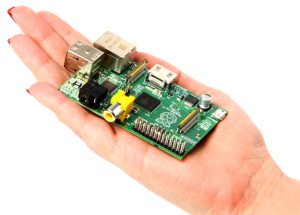Dan Aldred is an exceptional teacher, even amongst the already great bunch we have the pleasure of working with every day at Trinket. In addition to teaching sophmores (Year 10s, as they say over in the UK), Dan puts all of his educational material online at canyoucompute.co.uk, tecoed.co.uk and cambridgetech.co.uk. In this interview, Dan talks about how he got into coding, his love of Python, and the importance of the online network of teachers he’s connected to.
You can read more of our interviews of educational innovators here.

Elliott: How did you first learn to code?
Dan: As a child I had an Atari ST and created a simple password diary that required a password to enter and read the entries. You could add new entries and then lock them away from prying eyes. I enjoyed the thinking side, thinking how I could create the diary, what features would it have and how I would use the code. There was no internet so the only reference I had was the user guide that came with the computer. I used to try out various codes to see what would happen or use the ‘help’ function to list all the possible commands and then give test them out.
For me, Python is a language that feels alive, versatile and powerful.
At university I studied business systems and IT, one of the modules involved creating a website NotePad, HTML and a browser; I was really excited. We were taught some visual basic to manipulate spreadsheets and create customised functions.
My first teaching job was as an IT teacher and part of the syllabus covered MSW Logo and Robot Arm. At A level I taught VisualBasic databases and mini apps and as languages changed I adapted. I missed the Java era and have used Coursera and Codeacdemy to get myself up to speed. Then I was introduced to Python and was amazed and how fluid it was. For me, Python is a language that feels alive, versatile and powerful.
Elliott: Can you tell us about your path to becoming a teacher? How has your teaching evolved to where it is today?
Dan: I always wanted to be a teacher, although I never knew why until recently. My teaching now is more focused on learning and engaging students to think and ask questions. Trinket is a great tool for this: I can set a program for the students, it contains errors and fails, they ask me why, I asks them why they think it failed. I can then show them a program that works asking them to compare them and tell me why it works and the other does not, then they can correct the errors. CSS and HTML used to be a very dry language to teach because students were not motivated. Now, I give my students the lesson link and set them off. Like this.
I always wanted to be a teacher, although I never knew why until recently.
I can support them as needed. Some progress quickly and I can move them on further. Others struggle and I can support them to understand the concept and move forward. The point here is that all students learn, achieve and build their confidence.
Elliott: The Raspberry Pi has offered amazing new possibilities in classrooms around the world and it must have been exciting seeing these changes first-hand. What are the Raspberry Pi and the Raspberry Pi Certified Educator program and how have they influenced your teaching?
Dan: The Raspberry Pi is a low cost, credit-card sized computer that plugs into a computer monitor or TV, and uses a standard keyboard and mouse. It is a capable little device that enables people of all ages to explore computing, and to learn how to program in languages like Scratch and Python. It’s capable of doing everything you’d expect a desktop computer to do, from browsing the internet and playing high-definition video, to making spreadsheets, word-processing, and playing games.

What’s more, the Raspberry Pi has the ability to interact with the outside world, and has been used in a wide array of digital maker projects, from music machines and parent detectors to weather stations and tweeting birdhouses with infra-red cameras. We want to see the Raspberry Pi being used by kids all over the world to learn to program and understand how computers work.
As Head of Computing and IT I have frequently observed the learning and skills that are developed through programming and the understanding of computing concepts. As a Raspberry Pi Certified Educator I champion the use of the device within schools as a tool for learning. Code is no longer plain, the Pi brings to life coding concepts within new and exciting environments such as music composition, Minecraft, gaming, hardware hacking, electronics and many more. Students don’t refer to these activities as coding, they call them “Minecraft mashup”, “making music” or “hacking the weather”. Theses environments make learning fun, accessible and inspiring.
We want to see the Raspberry Pi being used by kids all over the world to learn to program and understand how computers work.
Elliott: Your sites www.tecoed.co.uk and www.canyoucompute.co.uk are great resources and you’re very involved with the educational community. What inspires you to make publicly available resources?
Dan: My philosophy is simple, if one teacher can use a resource, if one student can try something new, if I can inspire one person to learn, then sharing is worth it. I originally set up the websites to share learning and some of the projects that I was creating with the Raspberry Pi. They include learning materials, step by step instructions and the code so that anyone can build a cool hack.
Elliott: You mentioned in a previous conversation that you found Trinket via Twitter. How does social media influence your teaching?
Dan: Social media enables me to share resources and ideas with others from a range of industry areas and business, not just education. There are so many amazing ideas, quotes, pictures, diagrams that can be used in the classroom as a full lesson resource or a simple attention grabber or inspiration. There are so many helpful tweeters ready to help out and support. It really does bring people together.
Elliott: Could you give an example of how you use Trinket in your teaching for readers looking for inspiration for their next class?
Dan: Teaching Computer Science requires students to interact and create code, but often there are restrictions on the installation of software and IDEs in school. Getting the code to work is as challenging as learning the language and students are never confident that their code is correct and the convoluted running process is the issue. Trinket removes all these barriers. Students can code in an environment that works, the lesson becomes interactive, students can share their results, even better share their errors and ask each other for support.
You can see some examples of lessons here:
- Looking for Data in Text
- Javascript in an Hour
- Use HTML and CSS to Create Street Signs
- Convert images to colored spreadsheet with the Raspberry Pi
- The Minecraft PowerGlove
Elliott: What blogs, videos or other resources do you find useful in your teaching or would recommend readers check out?
Dan: I try to take at least 2 Coursera courses a year, they are between 6 – 8 weeks long and cover a range of subject areas. All learning is online and I am fascinated by the whole ‘flipped learning’ pedagogy.
Elliott: How can readers who have questions get in touch with you to chat further?
Dan: You can find me on Twitter at @dan_aldred or contact me via my website at www.tecoed.co.uk